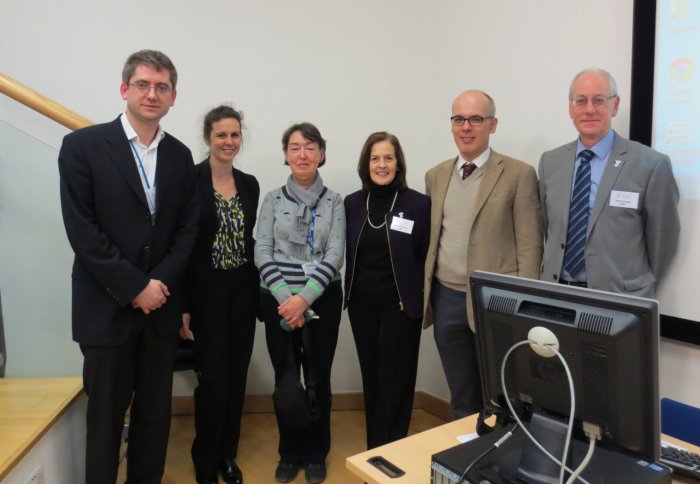Cholangiocarcinoma: Detecting a silent cancer
by Jo Seed

L to R: IGHIs Dr Chris Wadsworth, Dr Abigail Zabron, Mary Crossey, AMMFs Helen Morement, Prof Simon Taylor-Robinson & AMMFs Harry Corrigan
The only UK based Cholangiocarcinoma charity visited IGHI last week to find out about our research & diagnostics for this rare type of liver cancer.
Imperial’s Centre for Digestive and Gut Health based within the Institute of Global Health Innovation was delighted to welcome a visit from the AMMF this week. The AMMF is a UK based charity focused on raising awareness about the diagnostics and treatment of cholangiocarcinoma (CC), a rare type of liver cancer which attacks the bile ducts.
Although rare, CC is an aggressive type of cancer. The bile duct system, or "biliary" system, is made up of a series of tubes that begin in the liver and end in the small intestine. Bile is a fluid the digestive system uses to help break down fats and digest foods.
In most cases, there are no signs of bile duct cancer until it reaches the later stages, when symptoms can include jaundice (yellowing of the skin and the whites of the eyes), unintentional weight loss and abdominal pain. Because it is so difficult to diagnose accurately and early, CC is often advanced by the time of diagnosis and so surgery, currently the only potential cure, is not an option. For this reason only 5% will survive one year from a diagnosis of CC.
The exact cause of CC is unknown. However, some things may increase the chances of developing the condition. The most common include being over 65 years old or having a rare chronic liver disease called primary sclerosing cholangitis (PSC).
The AMMF is the only charity in the UK dedicated towards combatting this deadly cancer and was established by AMMF Chairman Trustee Mrs Helen Morement following the death of her husband from the disease 15 years ago. The AMMF are working with staff from Imperial to research ways of identifying it sooner in order to give the patient a better chance of survival after diagnoses.
The meeting, which took place at St Marys Hospital in Paddington, provided an excellent platform on which to update the AMMF on Imperial’s five year translational clinical research project, funded by the European Union Frame work 7 (www.prolifica.eu). The aim of the project is to reduce the incidence of liver cancer in three West African countries – Gambia, Nigeria and Senegal. The project also seeks to identify biomarkers (measurable indicators of the severity or presence of the disease) for the development of simple diagnostics for detecting cancer in resource-poor countries.
Closer to home, the meeting also provided an opportunity for members of the public affiliated with the AMMF and affected by the disease to find out more about our research and attend tours of our labs. They also attended various question and answer sessions in order to find out about new diagnostic and screening techniques. One such new technique is the use of a new detector coil, which is fitted directly into the bile duct rather than through the screening machine. This provides a much more accurate reading by improving the resolution of the image and thus being able to detect the cancer easier.
AMMF Chairman Trustee, Mrs Helen Morement, who led the 30 person delegation to IGHI said “I would like to thank Imperial so much for organising this event, and for the generous amount of time the team gave to provide such an informative and encouraging overview of cholangiocarcinoma research and progress”
“We were delighted to welcome the AMMF to Imperial” said Imperial’s Professor Simon Taylor-Robinson. “It gave us a great opportunity to not only update on our research but to also hear the touching stories of those affected by this silent yet deadly disease”.
Photos from the visit can be found on our Flickr pages here.
Article text (excluding photos or graphics) © Imperial College London.
Photos and graphics subject to third party copyright used with permission or © Imperial College London.
Reporter
Jo Seed
Institute of Global Health Innovation